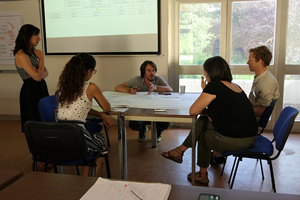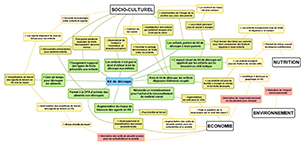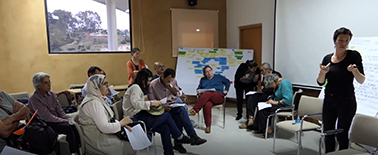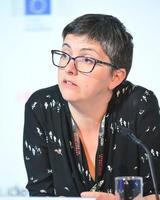Interview with Elodie Valette, URBAL project coordinator with Alison Blay Palmer. The aim of this project is to design a qualitative impact assessment methodology for food innovations in an urban context.
What are the main strengths/results of your project?
URBAL is a methodology under construction (2017-2020) that aims to assess the impacts of innovations on different dimensions of sustainability. This project has two strong points.
Firstly, it is a project at the service of field stakeholders who want to make their projects and actions evolve towards greater sustainability.
The URBAL methodology is designed to respond to the demands of field stakeholders, whether public or private, to accompany and guide them in their actions and decision-making with regard to sustainability objectives. Often lacking tools and with limited means (time, money, skills, etc.) to evaluate their actions with regard to sustainability issues, URBAL responds to these constraints by providing them with a simple, open-source, resource-efficient tool that is easily appropriated and adaptable to different contexts. This tool offers a qualitative and participatory evaluation that provides a reflective and informed view of the impacts or changes - expected, unexpected, proven or potential - brought about by the innovation, whether positive or negative in terms of sustainability.
This methodology thus makes it possible to accompany the strategic reflection of innovators on their activities. URBAL helps them to lead, manage, develop, improve and promote innovation. This methodology also helps donors and public actors in the decision-making process concerning the support (or not) of innovations.

Secondly, it is a project that aims to strengthen the capacity of these stakeholders to disseminate their innovations on other scales to contribute to the transition towards more sustainable food systems.
Innovations for more sustainable food systems are flourishing in cities and multiplying around the world. These initiatives have the potential to drive the transition to more sustainable urban food systems, provided that they do not remain isolated cases and that the changes made are far-reaching and sustainable. In other words, the capacity of single initiatives to contribute to the transformation of food systems is weak if they are not likely to be replicated, imitated, amplified, supported and disseminated at multiple scales (scaling capacity). As an illustration, in the literature we speak of "scaling out" in reference to the duplication and diffusion of innovation in other contexts, "scaling up" when institutional and organizational changes are produced by innovation, and "scaling deep" to refer to the transformations of socio-cultural norms and values produced by innovation.
The URBAL methodology, with its reflective and critical approach, accompanies these innovations so that they operate these changes of scale. In addition to identifying the changes (or impacts) brought about by the innovation in terms of sustainability, URBAL also identifies the facilitating elements or barriers to change. This information is valuable in the perspective of changing scale, for project leaders applying the method, but also for other project leaders likely to benefit from the results produced, in a process of building communities of practice. URBAL thus helps stakeholders to reflect on the conditions and methods for disseminating their innovations in order to contribute to the transition towards more sustainable food systems.

How is your project innovative?
The project provides public or private project leaders with a methodology for evaluating the impact of their actions and strategies in terms of sustainability in open access.
It is a qualitative evaluation of the impacts of these innovations. In recent years, quantitative methods of impact assessment have multiplied, but they often prove ineffective in the case of relatively recent, small-scale innovations which, for the most part, have few resources to devote to evaluation (time, money, skills, etc.). The aim is therefore not to measure but to inventory, represent and understand the impacts induced or expected by the activities implemented in these innovations. Once the operating modes of the impacts have been identified, URBAL proposes to prioritise their relevance according to the ambitions of the innovations. In doing so, and if the stakeholders so wish, the method makes it possible to prioritise and select the most important indicators in order to prepare a quantitative sustainability assessment.
This qualitative assessment approach is based on multi-stakeholder participation, involving innovation stakeholders (innovation carriers and actors, users, beneficiaries, similar innovation carriers) and sustainability experts. This methodology is mainly based on a collective intelligence workshop where the changes produced by the actions carried out by the innovation are identified in the short, medium and long term. This methodology is based on the theory of change and impact pathway assessment approaches. URBAL’s objective is to characterize the processes that lead an innovation to produce lasting changes (i.e. impacts), rather than to measure them.
This qualitative assessment provides a reflexive look at the changes - expected, unexpected, positive or negative, proven or potential - brought about by the innovation, the organizational and institutional locks to change, the synergies, the trade-offs.
URBAL enables stakeholders to assess the impacts of their innovations on six different dimensions of sustainability simultaneously: environmental, economic, socio-cultural, health and nutrition, food security and governance. This method makes it possible to highlight the tensions and synergies that may exist between different dimensions of sustainability and that emerge from the activities implemented within the innovation under study.
Finally, URBAL is a tool that can be easily appropriated by different stakeholders and adapted to different contexts. The methodology is based on a very wide variety of case studies. 14 innovations in 10 cities around the world (Baltimore, Mexico City, Berlin, Brasilia, Hanoi, Cape Town, Milan, Paris, Montpellier, Rabat; two other case studies in Mexico City and Paris have recently joined the project) help to co-construct and test this methodology. Beyond being spread all over the world, these innovations are very different from each other in order to guarantee the relevance and "flexibility" of the tool: 1) these innovations are carried by different stakeholders (private sector, public authorities or civil society), 2) touch on very varied themes and stakeholders (consumers, sectors, governance) and 3) are at very different stages of development (more or less advanced).


Elodie Valette, a geographer at CIRAD, is coordinating the URBAL project with Alison Blay Palmer, Professor of Geography and Environmental Studies at Wilfrid Laurier University.